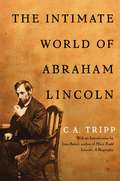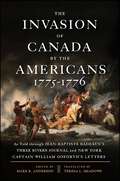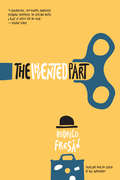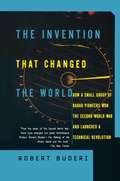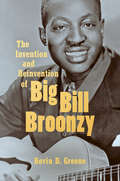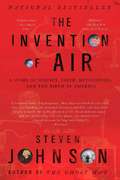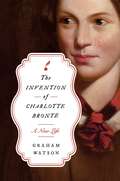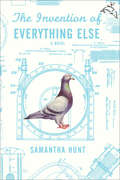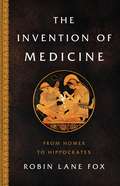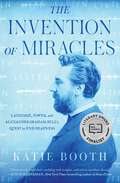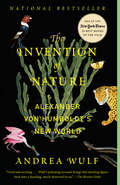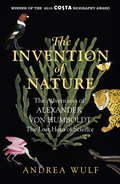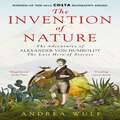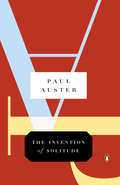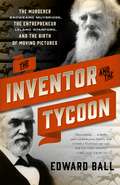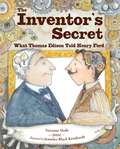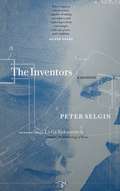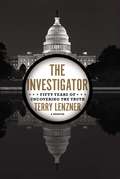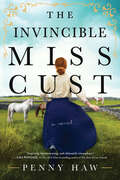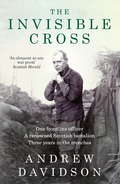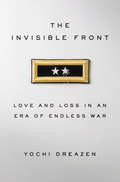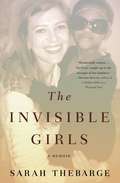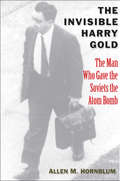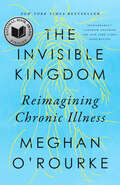- Table View
- List View
The Intimate World of Abraham Lincoln
by C. A. TrippThe late C. A. Tripp, a highly regarded sex researcher and colleague of Alfred Kinsey, and author of the runaway bestseller The Homosexual Matrix, devoted the last ten years of his life to an exhaustive study of Abraham Lincoln's writings and of scholarship about Lincoln, in search of hidden keys to his character. In The Intimate World of Abraham Lincoln, completed just weeks before he died, Tripp offers a full examination of Lincoln's inner life and relationships that, as Dr. Jean Baker argues in the Introduction, "will define the issue for years to come." Throughout this riveting work, new details are revealed about Lincoln's relations with a number of men. Long-standing myths are debunked convincingly -- in particular, the myth that Lincoln's one true love was Ann Rutledge, who died tragically young. Ultimately, Tripp argues that Lincoln's unorthodox loves and friendships were tied to his maverick beliefs about religion, slavery, and even ethics and morals. As Tripp argues, Lincoln was an "invert": a man who consistently turned convention on its head, who drew his values not from the dominant conventions of society, but from within. For years, a whisper campaign has mounted about Abraham Lincoln, focusing on his intimate relationships. He was famously awkward around single women. He was engaged once before Mary Todd, but his fiancée called off the marriage on the grounds that he was "lacking in smaller attentions." His marriage to Mary was troubled. Meanwhile, throughout his adult life, he enjoyed close relationships with a number of men. He shared a bed with Joshua Speed for four years as a young man, and -- as Tripp details here -- he shared a bed with an army captain while serving in the White House, when Mrs. Lincoln was away. As one Washington socialite commented in her diary, "What stuff!" This study reaches far beyond a brief about Lincoln's sexuality: it is an attempt to make sense of the whole man, as never before. It includes an Introduction by Jean Baker, biographer of Mary Todd Lincoln, and an Afterword containing reactions by two Lincoln scholars and one clinical psychologist and longtime acquaintance of C. A. Tripp. As Michael Chesson explains in one of the Afterword essays, "Lincoln was different from other men, and he knew it. More telling, virtually every man who knew him at all well, long before he rose to prominence, recognized it. In fact, the men who claimed to know him best, if honest, usually admitted that they did not understand him." Perhaps only now, when conventions of intimacy are so different, so open, and so much less rigid than in Lincoln's day, can Lincoln be fully understood.
The Invasion of Canada by the Americans, 1775-1776: As Told through Jean-Baptiste Badeaux's Three Rivers Journal and New York Captain William Goforth's Letters
by Mark R. Anderson; Teresa L. MeadowsThe Invasion of Canada by the Americans, 1775–1776 offers two significant, insightful, and intriguing first-hand accounts of the Revolutionary War. These previously untranslated and unpublished primary sources provide contrasting viewpoints from a Loyalist French-Canadian administrative official, Jean-Baptiste Badeaux, and a Patriot Continental officer, William Goforth. Compelling personal interactions with friends and neighbors, and local and provincial-level leaders—as occupier and occupied—are documented. Their stories climax during the two-month period in early 1776 when Goforth was military governor of Three Rivers and Badeaux served as his somewhat reluctant interpreter and unofficial advisor. Including their experiences with Benedict Arnold and Quebec's Governor Guy Carleton, as well as letters to Benjamin Franklin and John Jay, this unique book provides diverse insights into the invasion of Canada and its immediate impact on the people on both sides of the revolution.
The Invented Part
by Will Vanderhyden Rodrigo FresánWhat's the relationship between the real, the imagined, and the written? That's the question at the heart of Fresán's latest novel, an exploration of the mind of a disillusioned writer attempting to write his own story and rewrite reality. With a propulsive style that delves into memory, technology, literature, and pop culture, The Invented Part reaffirms the pleasures of storytelling.
The Invention That Changed the World: How a Small Group of Radar Pioneers Won the Second World War and Launched a Technological Revolution (Sloan Technology Series)
by Robert Buderi"The Invention That Changed the World by Robert Buderi is a dazzling study, combining hard science with the daily drama of warring nations struggling to avoid disaster.... He has woven together a remarkable tale of science, politics, and warfare." - Guy Halversoim, The Christian Science Monitor "Masterly. . . Buderi cannot be praised too highly for producing a scholarly and superbly researched book which is also enjoyable to read." - Ian Morison, New Scientist "Buderi's Book can awaken the interest of even the most jaded and nontechnical reader. Radar did change the world, and Buderi nicely describes how."- Norman N. Brown, The Associated Press "Much of our view of the technological achievements emerging from World War II is driven by nuclear fetishism, but a more fundamental truth is revealed in the subtitle to this remarkable book. . . . Through extensive interviews and impressive bibliographies, the author has produced a fascinating history." - Library Journal
The Invention and Reinvention of Big Bill Broonzy
by Kevin D. GreeneOver the course of his long career, legendary bluesman William "Big Bill" Broonzy (1893–1958) helped shape the trajectory of the genre, from its roots in the rural Mississippi River Delta, through its rise as a popular genre in the North, to its eventual international acclaim. Along the way, Broonzy adopted an evolving personal and professional identity, tailoring his self-presentation to the demands of the place and time. His remarkable professional fluidity mirrored the range of expectations from his audiences, whose ideas about race, national belonging, identity, and the blues were refracted through Broonzy as if through a prism. Kevin D. Greene argues that Broonzy's popular success testifies to his ability to navigate the cultural expectations of his different audiences. However, this constant reinvention came at a personal and professional cost. Using Broonzy's multifaceted career, Greene situates blues performance at the center of understanding African American self-presentation and racial identity in the first half of the twentieth century. Through Broonzy's life and times, Greene assesses major themes and events in African American history, including the Great Migration, urbanization, and black expatriate encounters with European culture consumers. Drawing on a range of historical source materials as well as oral histories and personal archives held by Broonzy's son, Greene perceptively interrogates how notions of race, gender, and audience reception continue to shape concepts of folk culture and musical authenticity.
The Invention of Air: A Story Of Science, Faith, Revolution, And The Birth Of America
by Steven JohnsonIn The Invention of Air, national bestselling author Steven Johnson tells the fascinating story of Joseph Priestley—scientist and theologian, protégé of Benjamin Franklin, friend of Thomas Jefferson—an eighteenth-century radical thinker who played pivotal roles in the invention of ecosystem science, the discovery of oxygen, the uses of oxygen, scientific experimentation, the founding of the Unitarian Church, and the intellectual development of the United States. As he did so masterfully in The Ghost Map, Steven Johnson uses a dramatic historical story to explore themes that have long engaged him: innovative strategies, intellectual models, and the way new ideas emerge and spread, and the environments that foster these breakthroughs.
The Invention of Charlotte Brontë: A New Life
by Graham WatsonA lucid, profoundly moving biography that challenges the established narrative to reveal the Brontë family as they&’ve never been seen before.Charlotte Brontë had a life as seemingly dramatic as her heroine Jane Eyre. Turning her back on her tragic past, Charlotte reinvented herself as an acclaimed author, a mysterious celebrity, and a passionate lover. Doing so meant burning many bridges, but her sudden death left her friends and admirers with more questions than answers. Tasked with telling the truth about Brontë&’s life, her friend, the novelist Elizabeth Gaskell, uncovered secrets of illicit love, family discord, and professional rivalries more incredible than any fiction. The result, a tell-all biography, was so scandalous it was banned and rewritten twice in six months—but not before it had given birth to the legend of the Brontës. The Invention of Charlotte Brontë presents a different, darker take on one of the most famous women writers of the nineteenth century, showing Charlotte to be a strong but flawed individual. Through evaluating key events as well as introducing new archival material into the story, this lively biography challenges the established narrative to reveal the Brontë family as they&’ve never been seen before.
The Invention of Everything Else: A Novel
by Samantha HuntNikola Tesla spends the last days of his extraordinary life at the Hotel New Yorker &“in this surreal historical novel [that] dazzles in the details&” (The New Yorker). It is 1943, and legendary inventor Nikola Tesla occupies a forbidden room on the 33rd floor of the Hotel New Yorker, stealing electricity. Broke, forgotten, and suffering from a weak heart, his only consolations are his memories and his daily walks to Bryant Park. Louisa, a young hotel chambermaid, is determined to befriend him. And as she helps him on his daily walks, she wins his affection through a shared love of pigeons. Little by little, he confides in her the tragic and tremendous story of his life. Meanwhile, Louisa&’s father is embarking on an unlikely mission to travel back in time to find his beloved late wife. A &“sophisticated pastiche of science fiction, fantasy, melodrama, and historical anecdote,&” The Invention of Everything Else is both a heartfelt story of love and death and an homage to one of history's most visionary scientists (Elle).
The Invention of Medicine: From Homer to Hippocrates
by Robin Lane FoxA preeminent classics scholar revises the history of medicine.Medical thinking and observation were radically changed by the ancient Greeks, one of their great legacies to the world. In the fifth century BCE, a Greek doctor put forward his clinical observations of individual men, women, and children in a collection of case histories known as the Epidemics. Among his working principles was the famous maxim "Do no harm." In The Invention of Medicine, acclaimed historian Robin Lane Fox puts these remarkable works in a wider context and upends our understanding of medical history by establishing that they were written much earlier than previously thought. Lane Fox endorses the ancient Greeks' view that their texts' author, not named, was none other than the father of medicine, the great Hippocrates himself. Lane Fox's argument changes our sense of the development of scientific and rational thinking in Western culture, and he explores the consequences for Greek artists, dramatists and the first writers of history. Hippocrates emerges as a key figure in the crucial change from an archaic to a classical world. Elegantly written and remarkably learned, The Invention of Medicine is a groundbreaking reassessment of many aspects of Greek culture and city life.
The Invention of Miracles: Language, Power, and Alexander Graham Bell's Quest to End Deafness
by Katie BoothFinalist for the PEN/Jacqueline Bograd Weld Award for Biography Finalist for the Mark Lynton History Prize &“Meticulously researched, crackling with insights, and rich in novelistic detail&” (Steve Silberman), this &“provocative, sensitive, beautifully written biography&” (Sylvia Nasar) tells the true—and troubling—story of Alexander Graham Bell&’s quest to end deafness. &“Researched and written through the Deaf perspective, this marvelously engaging history will have us rethinking the invention of the telephone.&” —Jaipreet Virdi, PhD, author of Hearing Happiness: Deafness Cures in History We think of Alexander Graham Bell as the inventor of the telephone, but that&’s not how he saw his own career. As the son of a deaf woman and, later, husband to another, his goal in life from adolescence was to teach deaf students to speak. Even his tinkering sprang from his teaching work; the telephone had its origins as a speech reading machine. The Invention of Miracles takes a &“stirring&” (The New York Times Book Review), &“provocative&” (The Boston Globe), &“scrupulously researched&” (Pittsburgh Post-Gazette) new look at an American icon, revealing the astonishing true genesis of the telephone and its connection to another, far more disturbing legacy of Bell&’s: his efforts to suppress American Sign Language. Weaving together a dazzling tale of innovation with a moving love story, the book offers a heartbreaking account of how a champion can become an adversary and an enthralling depiction of the deaf community&’s fight to reclaim a once-forbidden language. Katie Booth has been researching this story for more than fifteen years, poring over Bell&’s papers, Library of Congress archives, and the records of deaf schools around America. But she&’s also lived with this story for her entire life. Witnessing the damaging impact of Bell&’s legacy on her family would set her on a path that overturned everything she thought she knew about language, power, deafness, and the telephone.
The Invention of Nature: Alexander von Humboldt's New World
by Andrea WulfThe acclaimed author of Founding Gardeners reveals the forgotten life of Alexander von Humboldt, the visionary German naturalist whose ideas changed the way we see the natural world--and in the process created modern environmentalism.NATIONAL BEST SELLEROne of the New York Times 10 Best Books of the YearWinner of the Los Angeles Times Book Prize, The James Wright Award for Nature Writing, the Costa Biography Award, the Royal Geographic Society's Ness Award, the Sigurd F. Olson Nature Writing AwardFinalist for the Andrew Carnegie Medal for Excellence in Nonfiction, the Kirkus Prize Prize for Nonfiction, the Independent Bookshop Week Book AwardA Best Book of the Year: The New York Times, The Atlantic, The Economist, Nature, Jezebel, Kirkus Reviews, Publishers Weekly, New Scientist, The Independent, The Telegraph, The Sunday Times, The Evening Standard, The SpectatorAlexander von Humboldt (1769-1859) was an intrepid explorer and the most famous scientist of his age. In North America, his name still graces four counties, thirteen towns, a river, parks, bays, lakes, and mountains. His restless life was packed with adventure and discovery, whether he was climbing the highest volcanoes in the world or racing through anthrax-infected Siberia or translating his research into bestselling publications that changed science and thinking. Among Humboldt's most revolutionary ideas was a radical vision of nature, that it is a complex and interconnected global force that does not exist for the use of humankind alone. Now Andrea Wulf brings the man and his achievements back into focus: his daring expeditions and investigation of wild environments around the world and his discoveries of similarities between climate and vegetation zones on different continents. She also discusses his prediction of human-induced climate change, his remarkable ability to fashion poetic narrative out of scientific observation, and his relationships with iconic figures such as Simón Bolívar and Thomas Jefferson. Wulf examines how Humboldt's writings inspired other naturalists and poets such as Darwin, Wordsworth, and Goethe, and she makes the compelling case that it was Humboldt's influence that led John Muir to his ideas of natural preservation and that shaped Thoreau's Walden. With this brilliantly researched and compellingly written book, Andrea Wulf shows the myriad fundamental ways in which Humboldt created our understanding of the natural world, and she champions a renewed interest in this vital and lost player in environmental history and science.From the Hardcover edition.
The Invention of Nature: The Adventures of Alexander von Humboldt, the Lost Hero of Science: Costa & Royal Society Prize Winner
by Andrea WulfWINNER OF THE 2015 COSTA BIOGRAPHY AWARDWINNER OF THE ROYAL SOCIETY SCIENCE BOOK PRIZE 2016'A thrilling adventure story' Bill Bryson'Dazzling' Literary Review 'Brilliant' Sunday Express'Extraordinary and gripping' New Scientist'A superb biography' The Economist'An exhilarating armchair voyage' GILES MILTON, Mail on Sunday Alexander von Humboldt (1769-1859) is the great lost scientist - more things are named after him than anyone else. There are towns, rivers, mountain ranges, the ocean current that runs along the South American coast, there's a penguin, a giant squid - even the Mare Humboldtianum on the moon. His colourful adventures read like something out of a Boy's Own story: Humboldt explored deep into the rainforest, climbed the world's highest volcanoes and inspired princes and presidents, scientists and poets alike. Napoleon was jealous of him; Simon Bolívar's revolution was fuelled by his ideas; Darwin set sail on the Beagle because of Humboldt; and Jules Verne's Captain Nemo owned all his many books. He simply was, as one contemporary put it, 'the greatest man since the Deluge'.Taking us on a fantastic voyage in his footsteps - racing across anthrax-infected Russia or mapping tropical rivers alive with crocodiles - Andrea Wulf shows why his life and ideas remain so important today. Humboldt predicted human-induced climate change as early as 1800, and The Invention of Nature traces his ideas as they go on to revolutionize and shape science, conservation, nature writing, politics, art and the theory of evolution. He wanted to know and understand everything and his way of thinking was so far ahead of his time that it's only coming into its own now. Alexander von Humboldt really did invent the way we see nature.
The Invention of Nature: The Adventures of Alexander von Humboldt, the Lost Hero of Science: Costa & Royal Society Prize Winner
by Andrea WulfWINNER OF THE 2015 COSTA BIOGRAPHY AWARDWINNER OF THE ROYAL SOCIETY PRIZE 2016'Dazzling' Literary Review 'Brilliant' Sunday Express'Extraordinary and gripping' New Scientist'A superb biography' The Economist'An exhilarating armchair voyage' GILES MILTON, Mail on Sunday Alexander von Humboldt (1769-1859) is the great lost scientist - more things are named after him than anyone else. There are towns, rivers, mountain ranges, the ocean current that runs along the South American coast, there's a penguin, a giant squid - even the Mare Humboldtianum on the moon. His colourful adventures read like something out of a Boy's Own story: Humboldt explored deep into the rainforest, climbed the world's highest volcanoes and inspired princes and presidents, scientists and poets alike. Napoleon was jealous of him; Simon Bolívar's revolution was fuelled by his ideas; Darwin set sail on the Beagle because of Humboldt; and Jules Verne's Captain Nemo owned all his many books. He simply was, as one contemporary put it, 'the greatest man since the Deluge'.Taking us on a fantastic voyage in his footsteps - racing across anthrax-infected Russia or mapping tropical rivers alive with crocodiles - Andrea Wulf shows why his life and ideas remain so important today. Humboldt predicted human-induced climate change as early as 1800, and The Invention of Nature traces his ideas as they go on to revolutionize and shape science, conservation, nature writing, politics, art and the theory of evolution. He wanted to know and understand everything and his way of thinking was so far ahead of his time that it's only coming into its own now. Alexander von Humboldt really did invent the way we see nature.Recorded by arrangement with Doubleday, an imprint of the Knopf Doubleday Publishing Group, a division of Penguin Random House LLC; (P)2015 Highbridge, a division of Recorded Books
The Invention of Solitude (Narrativas Contempor Series)
by Paul AusterIn this debut work by New York Times-bestselling author Paul Auster (The New York Trilogy), The Invention of Solitude, a memoir, established Auster’s reputation as a major new voice in American writing. His moving and personal meditation on fatherhood is split into two stylistically separate sections. In the first, Auster reflects on the memories of his father who was a distant, undemonstrative, and cold man who died an untimely death. As he sifts through his Father’s things, Auster uncovers a sixty-year-old murder mystery that sheds light on his father’s elusive character. In the second section, the perspective shifts and Auster begins to reflect on his own identity as a father by adopting the voice of a narrator, #147;A. ” Through a mosaic of images, coincidences, and associations #147;A,” contemplates his separation from his son, his dying grandfather, turning the story into a self-conscious reflection on the process of writing.
The Inventor and the Tycoon: A Gilded Age Murder and the Birth of Moving Pictures
by Edward BallFrom the National Book Award-winning author of Slaves in the Family, a riveting true life/true crime narrative of the partnership between the murderer who invented the movies and the robber baron who built the railroads. One hundred and thirty years ago Eadweard Muybridge invented stop-motion photography, anticipating and making possible motion pictures. He was the first to capture time and play it back for an audience, giving birth to visual media and screen entertainments of all kinds. Yet the artist and inventor Muybridge was also a murderer who killed coolly and meticulously, and his trial is one of the early instances of a media sensation. His patron was railroad tycoon (and former California governor) Leland Stanford, whose particular obsession was whether four hooves of a running horse ever left the ground at once. Stanford hired Muybridge and his camera to answer that question. And between them, the murderer and the railroad mogul launched the age of visual media. Set in California during its frontier decades, The Tycoon and the Inventor interweaves Muybridge's quest to unlock the secrets of motion through photography, an obsessive murder plot, and the peculiar partnership of an eccentric inventor and a driven entrepreneur. A tale from the great American West, this popular history unspools a story of passion, wealth, and sinister ingenuity.
The Inventor's Secret: What Thomas Edison Told Henry Ford
by Suzanne SladeBoth Thomas Edison and Henry Ford started off as insatiably curious tinkerers. That curiosity led them to become inventors—with very different results. As Edison invented hit after commercial hit, gaining fame and fortune, Henry struggled to make a single invention (an affordable car) work. Witnessing Thomas's glorious career from afar, a frustrated Henry wondered about the secret to his success. This little-known story is a fresh, kid-friendly way to show how Thomas Edison and Henry Ford grew up to be the most famous inventors in the world—and best friends, too.
The Inventors: A Memoir
by Peter Selgin Lidia YuknavitchIn the Fall of 1970, at the start of eighth grade, Peter Selgin fell in love with the young teacher who'd arrived from Oxford wearing Frye boots, with long blond hair, and a passion for his students that was as intense as it was rebellious. The son of an emotionally remote inventor, Peter was also a twin competing for the attention and affection of his parents. He had a burning need to feel special.The new teacher supplied that need. Together they spent hours in the teacher's carriage house, discussing books, playing chess, drinking tea, and wrestling. They were inseparable, until the teacher "resigned" from his job and left. Over the next ten years Peter and the teacher corresponded copiously and met occasionally, their last meeting ending in disaster. Only after the teacher died did Peter learn that he'd done all he could to evade his past, identifying himself first as an orphaned Rhodes Scholar, and later as a Native American.As for Peter's father, the genius with the English accent who invented the first dollar-bill changing machine, he was the child of Italian Jews-something else Peter discovered only after his death. Paul Selgin and the teacher were both self-inventors, creatures of their own mythology, inscrutable men whose denials and deceptions betrayed the trust of the boy who looked up to them.The Inventors is the story of a man's search for his father and a boy's passionate relationship with his teacher, of how these two enigmas shaped that boy's journey into manhood, filling him with a sense of his own unique destiny. It is a story of promises kept and broken as the author uncovers the truth-about both men, and about himself. For like them-like all of us-Peter Selgin, too, is his own inventor.
The Investigator
by Terry LenznerThe Los Angeles Times once called investigative lawyer Terry Lenzner "one of the most powerful and dreaded private investigators in the world. ” In his fifty-year career, Lenzner has worked with politicians, celebrities, governments, and corporations worldwide; with a steadfast commitment to the truth, he has uncovered facts that have shaped policy and influenced major legal battles. In this captivating memoir, Lenzner speaks about his varied career and high-profile cases for the first time. At the Justice Department in 1964, he investigated the murder of three civil rights workers-an infamous event that inspired the film Mississippi Burning. He led the national Legal Services Program for the poor, prosecuted organized crime in New York, defended peace activist Philip Berrigan, and represented CIA operative Sid Gottlieb. As a counsel to the Senate Watergate Committee, Lenzner investigated Nixon’s dirty tricks and followed the money trail that led to the Watergate burglary and cover-up. He was the first person to deliver a congressional subpoena to a sitting U. S. president. He uncovered cost overruns of the Alaska oil pipeline, helped identify the Unabomber, investigated the circumstances of Princess Diana’s death, and cleared Hugo Chavez of false corruption charges. Lenzner also worked with President Clinton’s defense team during the impeachment hearings. The Investigator is a riveting personal account: Lenzner astounds with anecdotes of scandal and intrigue, offers lessons in investigative methods, and provides an eye-opening look behind some of the most talked-about media stories and world events of our time. .
The Invincible Miss Cust: A Novel
by Penny HawSheReads Best Historical Fiction of 2022 Finalist!"Inspiring, heartwarming, and ultimately triumphant." —Lisa Wingate, #1 New York Times bestselling author of The Book of Lost Friends"What a remarkable woman—and what an enthralling story!" —Janet Skeslien Charles, New York Times bestselling author of The Paris LibraryMust-read historical fiction for fans of Marie Benedict and Tracey Enerson Wood, based on the real life of Britain's first woman veterinary surgeon.Aleen Cust has big dreams. And no one—not her family, society, or the law—will stop her.Born in Ireland in 1868 to an aristocratic English family, Aleen knows she is destined to work with animals, even if her family is appalled by the idea of a woman pursuing a veterinary career. Going against their wishes but with the encouragement of the guardian assigned to her upon her father's death, Aleen attends the New Veterinary College in Edinburgh, enrolling as A. I. Custance to spare her family the humiliation they fear. At last, she is on her way to becoming a veterinary surgeon! Little does she know her biggest obstacles lie ahead.The Invincible Miss Cust is based on the real life of Aleen Isabel Cust, who defied her family and society to become Britain and Ireland's first woman veterinary surgeon. Through Penny Haw's meticulous research, riveting storytelling, and elegant prose, Aleen's story of ambition, determination, family, friendship, and passion comes to life. It is a story that, even today, women will recognize, of battling patriarchy and an unequal society to realize one's dreams and pave the way for other women in the face of seemingly insurmountable odds.More Praise for The Invincible Miss Cust:"The Invincible Miss Cust is an absolute delight, an exceptional, immersive work of historical fiction set amid the beautifully detailed landscapes of Ireland and England." —Jennifer Chiaverini, New York Times bestselling author of Switchboard Soldiers"A skillfully told story of an extraordinary woman's grit, determination, and devotion to her dream. Detailed and evocative, The Invincible Miss Cust is an engrossing read." —Shana Abé, New York Times bestselling author of The Second Mrs. Astor"I loved this gripping and inspirational book! Her courage and independence of spirit shine through on every beautifully-written page as she faces life's triumphs and tragedies." —Fiona Valpy, bestselling author of The Dressmaker's Gift"An amazing story! Haw's descriptive prose and deft characterizations lead us through Cust's remarkable life, setbacks and triumphs, and leaves us in awe of her perseverance, determination, and loyalty." —Katherine Reay, bestselling author of The London House and The Printed Letter Bookshop
The Invisible Cross: One frontline officer, three years in the trenches, a remarkable untold story
by Andrew DavidsonThe unseen letters of the only British officer to spend three years in the trenches throughout the First World WarColonel Graham Chaplin, commander of the Cameron Highlanders, wrote letters from the trenches almost daily to the wife he had married just before the war began. Even if he had no time to write, he would at least send a postcard to reassure her he was 'Quite well'. These personal and loving letters give a rare insight into the mind of a serving officer, his worries about his men and his family back home, his concern for the progress of the war (however cautiously phrased) and his comments on the growing list of friends dead or wounded.Having once refused what he considered unacceptably dangerous orders to send his troops over the top during the Battle of Loos, Chaplin wasn't promoted out of the trenches until 1917. Respected and trusted by his men, he was, even so, the only officer to whom this happened.Andrew Davidson, author of the highly praised Fred's War, analyses Chaplin's unique status and weaves around his letters a fascinating portrait of a soldier's life and of the war on the Western Front.
The Invisible Cross: One frontline officer, three years in the trenches, a remarkable untold story
by Andrew DavidsonThe unseen letters of the only British officer to spend three years in the trenches throughout the First World WarColonel Graham Chaplin, commander of the Cameron Highlanders, wrote letters from the trenches almost daily to the wife he had married just before the war began. Even if he had no time to write, he would at least send a postcard to reassure her he was 'Quite well'. These personal and loving letters give a rare insight into the mind of a serving officer, his worries about his men and his family back home, his concern for the progress of the war (however cautiously phrased) and his comments on the growing list of friends dead or wounded.Having once refused what he considered unacceptably dangerous orders to send his troops over the top during the Battle of Loos, Chaplin wasn't promoted out of the trenches until 1917. Respected and trusted by his men, he was, even so, the only officer to whom this happened.Andrew Davidson, author of the highly praised Fred's War, analyses Chaplin's unique status and weaves around his letters a fascinating portrait of a soldier's life and of the war on the Western Front.
The Invisible Front: Love and Loss in an Era of Endless War
by Yochi DreazenThe unforgettable story of a military family that lost two sons—one to suicide and one in combat—and channeled their grief into fighting the armed forces’ suicide epidemic. <P> Major General Mark Graham was a decorated two-star officer whose integrity and patriotism inspired his sons, Jeff and Kevin, to pursue military careers of their own. His wife Carol was a teacher who held the family together while Mark's career took them to bases around the world. When Kevin and Jeff die within nine months of each other—Kevin commits suicide and Jeff is killed by a roadside bomb in Iraq—Mark and Carol are astonished by the drastically different responses their sons’ deaths receive from the Army. While Jeff is lauded as a hero, Kevin’s death is met with silence, evidence of the terrible stigma that surrounds suicide and mental illness in the military. Convinced that their sons died fighting different battles, Mark and Carol commit themselves to transforming the institution that is the cornerstone of their lives.<P> <i>The Invisible Front</i> is the story of how one family tries to set aside their grief and find purpose in almost unimaginable loss. The Grahams work to change how the Army treats those with PTSD and to erase the stigma that prevents suicidal troops from getting the help they need before making the darkest of choices. Their fight offers a window into the military’s institutional shortcomings and its resistance to change – failures that have allowed more than 2,000 troops to take their own lives since 2001. Yochi Dreazen, an award-winning journalist who has covered the military since 2003, has been granted remarkable access to the Graham family and tells their story in the full context of two of America’s longest wars. Dreazen places Mark and Carol’s personal journey, which begins when they fall in love in college and continues through the end of Mark's thirty-four year career in the Army, against the backdrop of the military’s ongoing suicide spike, which shows no signs of slowing. With great sympathy and profound insight, <i>The Invisible Front</i> details America's problematic treatment of the troops who return from war far different than when they'd left and uses the Graham family’s work as a new way of understanding the human cost of war and its lingering effects off the battlefield.
The Invisible Girls: A Memoir
by Sarah ThebargeTwenty-seven-year-old Sarah Thebarge had it all - a loving boyfriend, an Ivy League degree, and a successful career - when her life was derailed by an unthinkable diagnosis: aggressive breast cancer. After surviving the grueling treatments - though just barely - Sarah moved to Portland, Oregon, to start over. There, a chance encounter with an exhausted African mother and her daughters transformed her life again. A Somali refugee whose husband had left her, Hadhi was struggling to raise five young daughters, half a world a way from her war-torn homeland. Alone in a strange country, Hadhi and the girls were on the brink of starvation in their own home, "invisible" to their neighbors and to the world. As Sarah helped Hadhi and the girls navigate American life, her outreach to the family became a source of courage and a lifeline for herself. Poignant, at times shattering, Sarah Thebarge's riveting memoir invites readers to engage in her story of finding connection, love, and redemption in the most unexpected places.
The Invisible Harry Gold
by Allen M. HornblumIn the history of Soviet espionage in America, few people figure more crucially than Harry Gold. A Russian Jewish immigrant who spied for the Soviets from 1935 until 1950, Gold was an accomplished industrial and military espionage agent. He was assigned to be physicist Klaus Fuchs's "handler" and ultimately conveyed sheaves of stolen information about the Manhattan Project from Los Alamos to Russian agents. He is literally the man who gave the USSR the plans for the atom bomb. The subject of the most intensive public manhunt in the history of the FBI, Gold was arrested in May 1950. His confession revealed scores of contacts, and his testimony in the trial of the Rosenbergs proved pivotal. Yet among his co-workers, fellow prisoners at Lewisburg Penitentiary, and even those in the FBI, Gold earned respect, admiration, and affection. InThe Invisible Harry Gold, journalist and historian Allen Hornblum paints a surprising portrait of this notorious yet unknown figure. Through interviews with many individuals who knew Gold and years of research into primary documents, Hornblum has produced a gripping account of how a fundamentally decent and well-intentioned man helped commit the greatest scientific theft of the twentieth century.
The Invisible Kingdom: Reimagining Chronic Illness
by Meghan O'RourkeA NEW YORK TIMES BESTSELLERFINALIST FOR THE 2022 NATIONAL BOOK AWARD FOR NONFICTIONNamed one of the BEST BOOKS OF 2022 by NPR, The New Yorker, Time, and Vogue&“Remarkable.&” –Andrew Solomon, The New York Times Book Review"At once a rigorous work of scholarship and a radical act of empathy.&”—Esquire"A ray of light into those isolated cocoons of darkness that, at one time or another, may afflict us all.&” —The Wall Street Journal"Essential."—The Boston GlobeA landmark exploration of one of the most consequential and mysterious issues of our time: the rise of chronic illness and autoimmune diseasesA silent epidemic of chronic illnesses afflicts tens of millions of Americans: these are diseases that are poorly understood, frequently marginalized, and can go undiagnosed and unrecognized altogether. Renowned writer Meghan O&’Rourke delivers a revelatory investigation into this elusive category of &“invisible&” illness that encompasses autoimmune diseases, post-treatment Lyme disease syndrome, and now long COVID, synthesizing the personal and the universal to help all of us through this new frontier. Drawing on her own medical experiences as well as a decade of interviews with doctors, patients, researchers, and public health experts, O&’Rourke traces the history of Western definitions of illness, and reveals how inherited ideas of cause, diagnosis, and treatment have led us to ignore a host of hard-to-understand medical conditions, ones that resist easy description or simple cures. And as America faces this health crisis of extraordinary proportions, the populations most likely to be neglected by our institutions include women, the working class, and people of color. Blending lyricism and erudition, candor and empathy, O&’Rourke brings together her deep and disparate talents and roles as critic, journalist, poet, teacher, and patient, synthesizing the personal and universal into one monumental project arguing for a seismic shift in our approach to disease. The Invisible Kingdom offers hope for the sick, solace and insight for their loved ones, and a radical new understanding of our bodies and our health.
